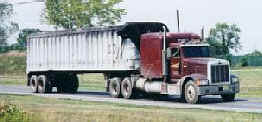DISPOSAL BANS & WASTE IMPORTS

Disposal Bans vs Recycling Goals
Disposal Bans, rather than 'recycling goals', are the best tools to end waste disposal and waste imports. Recycling goals do not stop waste disposal. Recyclables can end up in landfills and incinerators if there is no disposal ban in place. In addition, there is no effective way to enforce a recycling goal, whereas, enforcement officials are able to enforce disposal bans. As a political strategy, pursuing the implementation of a series of disposal bans has a better chance of success with the public acceptance, than attempting to pass a comprehensive state or federal solid waste plan.
Disposal Bans - Silver Bullets in the Trash Wars!
See:
WASTE IMPORT & EXPORT Statistics
See: Misinterpretation
of Federal Court Decisions - What the Courts Really Said About Controlling
Waste Imports:
One of the most effective ways to control or eliminate out-of-state waste is to utilize "disposal bans." A disposal ban prohibits designated types of waste from landfills and incinerators. It must be comprehensive and non-discriminating in order to meet the criteria set by the federal courts.
If state "A" bans all yard waste for disposal, then no other state may dispose of its yard waste in state "A's" landfills or incinerators. The result is that one type of waste has been eliminated for disposal. The more types of waste a state bans for disposal, the fewer types of waste will be imported for disposal.
Disposal bans can vary from state to state. For example, many states ban lead acid batteries, hazardous waste, tires, yard waste, and other wastes. However, many of these bans are partial, not comprehensive. In order for disposal bans to affect waste imports, they must not allow for exceptions; otherwise waste exporting states could successfully challenge the ban in court.
Various strategies can be employed to implement and support disposal bans. A combination of return-for-deposit and producer-takeback laws have already been used for waste streams, such as food, drink, and other containers. Compost programs are appropriate for yard, food, and other organic waste. Minimum content laws for paper, glass, metal, and other waste streams can help guarantee markets for recyclables.
PROMOTING DISPOSAL BANS:
Massachusetts, U.S.Lead Batteries |
Leaves |
Tires |
White Goods |
Other Yard Waste |
Aluminum Containers |
Metal or Glass |
Single Polymer Plastics |
Recyclable Paper |
Cathode Ray Tubes |
Asphalt Pavement, Brick and Concrete |
Metal |
Wood |
Nova Scotia, Canada (use search engine to locate information on "disposal bans"...lots of it.
- Redeemed beverage containers
- Corrugated cardboard
- Newsprint
- Used tires
- Automotive lead-acid batteries
- Leaf and yard waste
- Post-consumer paint products
- Ethylene glycol (automotive antifreeze)
- Steel/tin food containers
- Glass food containers
- #2 HDPE non-hazardous containers (ice cream containers, plastic jugs, detergent bottles, etc.)
- Low density polyethylene bags and packaging
- Compostable organic material (food waste, yard waste, soiled and non-recyclable paper)
FOUR-STEP SOLUTION TO WASTE IMPORTS:
1. States could implement as many ‘waste disposal bans’ as possible, as soon as possible. This will immediately impact waste imports (from other states and nations), making those states far less desirable dump sites. It is important to note that many states current disposal bans are only partial, such as Pennsylvania's alledged "yard waste" ban.
2. Develop a true ‘state solid waste plan’, per federal requirements, to maximize waste reduction and recycling. See: Public Law 89-272, 42 U.S.C., § 6941 - 6949.
3. Request the Department of Justice to compel the EPA to enforce the Sate Planning provisions of the Solid Waste Disposal Act, or file a federal lawsuit against the EPA for same. This would compel states to maximize waste reduction and recycling, per the Act, thus reducing waste exports across the nation.
4. Call on the Congress to pass legislation to prohibit the import and export of disposal waste from foreign countries - an issue not addressed in the Solid Waste Disposal Act. See - Foreign Waste
'ZWA REPORTS' & NEWS ON WASTE IMPORTS:
- Jun 29: Va. Laws On Imports Of Trash Blocked Judge, PA DEP Update. Once again, a federal court throws out poorly conceived anti-waste import legislation. Observers may question why the Virginia legislature passed a law that could not, even remotely, stand up to judicial review. This case bolsters the argument that only 'disposal bans' can effectively stop waste imports. Read decision here.
- Mar 1: PA DEP Misleads on Yard waste Disposal Ban...Again
- Feb 22: Trash Wars - Are Politicians Shooting Selves In Foot?
- Feb 11, 1999: Waste Crisis in Pennsylvania
- Sep 16: States Can Control Waste Imports
- May 5: State of the Nation's Waste
- Apr 22, 1998: The Politics of Waste in Pennsylvania
ALSO SEE:
- State Plans
- Yard Waste Disposal Ban
- Foreign Waste
- Zero Waste
- What the Federal Courts 'Really' Said About Controlling Waste Imports
- Faulty Federal Interstate Waste Legislation
